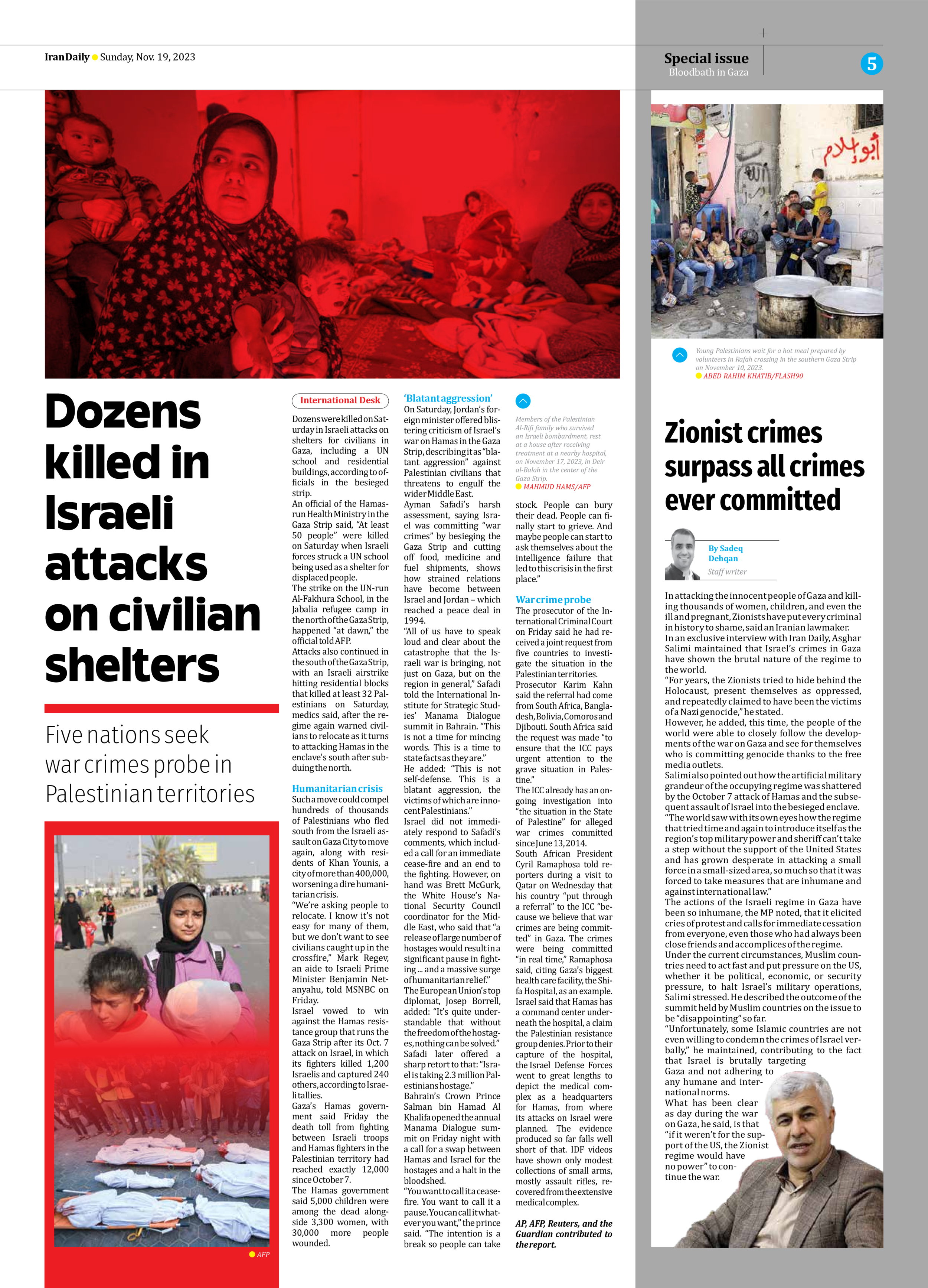
Dozens killed in Israeli attacks on civilian shelters
Five nations seek war crimes probe in Palestinian territories
Dozens were killed on Saturday in Israeli attacks on shelters for civilians in Gaza, including a UN school and residential buildings, according to officials in the besieged strip.
An official of the Hamas-run Health Ministry in the Gaza Strip said, “At least 50 people” were killed on Saturday when Israeli forces struck a UN school being used as a shelter for displaced people.
The strike on the UN-run Al-Fakhura School, in the Jabalia refugee camp in the north of the Gaza Strip, happened “at dawn,” the official told AFP.
Attacks also continued in the south of the Gaza Strip, with an Israeli airstrike hitting residential blocks that killed at least 32 Palestinians on Saturday, medics said, after the regime again warned civilians to relocate as it turns to attacking Hamas in the enclave’s south after subduing the north.
Humanitarian crisis
Such a move could compel hundreds of thousands of Palestinians who fled south from the Israeli assault on Gaza City to move again, along with residents of Khan Younis, a city of more than 400,000, worsening a dire humanitarian crisis.
“We’re asking people to relocate. I know it’s not easy for many of them, but we don’t want to see civilians caught up in the crossfire,” Mark Regev, an aide to Israeli Prime Minister Benjamin Netanyahu, told MSNBC on Friday.
Israel vowed to win against the Hamas resistance group that runs the Gaza Strip after its Oct. 7 attack on Israel, in which its fighters killed 1,200 Israelis and captured 240 others, according to Israeli tallies.
Gaza’s Hamas government said Friday the death toll from fighting between Israeli troops and Hamas fighters in the Palestinian territory had reached exactly 12,000 since October 7.
The Hamas government said 5,000 children were among the dead alongside 3,300 women, with 30,000 more people wounded.
‘Blatant aggression’
On Saturday, Jordan’s foreign minister offered blistering criticism of Israel’s war on Hamas in the Gaza Strip, describing it as “blatant aggression” against Palestinian civilians that threatens to engulf the wider Middle East.
Ayman Safadi’s harsh assessment, saying Israel was committing “war crimes” by besieging the Gaza Strip and cutting off food, medicine and fuel shipments, shows how strained relations have become between Israel and Jordan – which reached a peace deal in 1994.
“All of us have to speak loud and clear about the catastrophe that the Israeli war is bringing, not just on Gaza, but on the region in general,” Safadi told the International Institute for Strategic Studies’ Manama Dialogue summit in Bahrain. “This is not a time for mincing words. This is a time to state facts as they are.”
He added: “This is not self-defense. This is a blatant aggression, the victims of which are innocent Palestinians.”
Israel did not immediately respond to Safadi’s comments, which included a call for an immediate cease-fire and an end to the fighting. However, on hand was Brett McGurk, the White House’s National Security Council coordinator for the Middle East, who said that “a release of large number of hostages would result in a significant pause in fighting ... and a massive surge of humanitarian relief.”
The European Union’s top diplomat, Josep Borrell, added: “It’s quite understandable that without the freedom of the hostages, nothing can be solved.”
Safadi later offered a sharp retort to that: “Israel is taking 2.3 million Palestinians hostage.”
Bahrain’s Crown Prince Salman bin Hamad Al Khalifa opened the annual Manama Dialogue summit on Friday night with a call for a swap between Hamas and Israel for the hostages and a halt in the bloodshed.
“You want to call it a cease-fire. You want to call it a pause. You can call it whatever you want,” the prince said. “The intention is a break so people can take stock. People can bury their dead. People can finally start to grieve. And maybe people can start to ask themselves about the intelligence failure that led to this crisis in the first place.”
War crime probe
The prosecutor of the International Criminal Court on Friday said he had received a joint request from five countries to investigate the situation in the Palestinian territories.
Prosecutor Karim Kahn said the referral had come from South Africa, Bangladesh, Bolivia, Comoros and Djibouti. South Africa said the request was made “to ensure that the ICC pays urgent attention to the grave situation in Palestine.”
The ICC already has an ongoing investigation into “the situation in the State of Palestine” for alleged war crimes committed since June 13, 2014.
South African President Cyril Ramaphosa told reporters during a visit to Qatar on Wednesday that his country “put through a referral” to the ICC “because we believe that war crimes are being committed” in Gaza. The crimes were being committed “in real time,” Ramaphosa said, citing Gaza’s biggest health care facility, the Shifa Hospital, as an example. Israel said that Hamas has a command center underneath the hospital, a claim the Palestinian resistance group denies. Prior to their capture of the hospital, the Israel Defense Forces went to great lengths to depict the medical complex as a headquarters for Hamas, from where its attacks on Israel were planned. The evidence produced so far falls well short of that. IDF videos have shown only modest collections of small arms, mostly assault rifles, recovered from the extensive medical complex.
AP, AFP, Reuters, and the Guardian contributed to the report.







